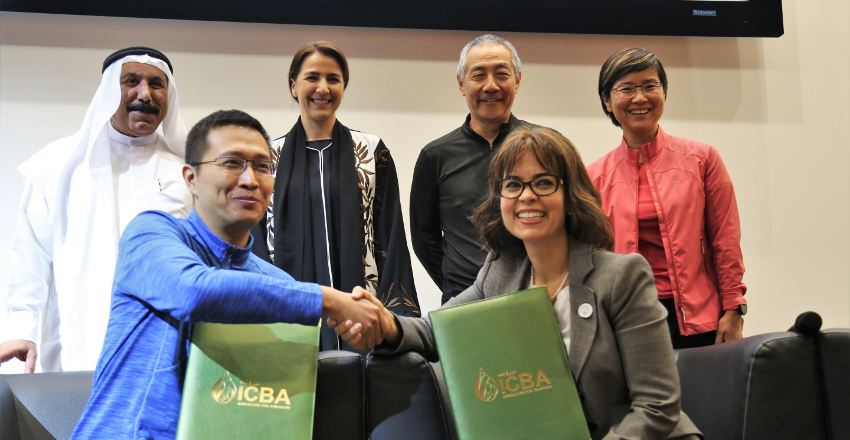United Arab Emirates introduces dedicated Center in Genomics as part of Future Food Security Agenda

ICBA, BGI partner to set up advanced genomics center in the United Arab Emirates
The International Center for Biosaline Agriculture (ICBA) has joined forces with BGI, the world's largest genomics organization, to establish an advanced genomics center in the United Arab Emirates (UAE).
The two organizations have also agreed to conduct advanced research on, among other things, salt-tolerant crops such as Salicornia and quinoa.
An agreement of intent to establish the center was recently signed between both parties. A senior BGI delegation led by the company’s president Dr. Wang Jian visited ICBA to learn about the center’s research programs and latest achievements. During the visit, a high-profile meeting was organized between H.E. Mariam bint Mohammed Almheiri – Minister of State for Future Food Security, Dr. Wang Jian and senior BGI executives, and Dr. Ismahane Elouafi, Director General of ICBA, to discuss a roadmap and key milestones to ensure the effective establishment of the advanced genomics center.
During the discussions, Dr. Ismahane Elouafi briefed the BGI delegation about the center’s research efforts in climate change adaptation, aquaculture and bioenergy, natural resources management, and crop productivity and diversification. Following the meeting, the delegation toured the Emirates Soil Museum, energy- and water-saving greenhouses and net-houses, an integrated aqua-agriculture system and experimental fields for quinoa, Salicornia, pearl millet and sorghum.
Speaking of the collaboration between ICBA and BGI, H.E. Mariam bint Mohammed Almheiri said: “Our country has firmly established itself as a place where we create the future for a better tomorrow. The UAE makes significant strides in embracing new and futuristic technologies that will shape our future and play a vital role in how our nation grows. We believe that science and technology are our greatest tools, allowing us to address current food security challenges much more efficiently, but also to forecast future challenges, and proactively come up with innovations to overcome those challenges on our path towards exemplary sustainable development.”
She added: “Through this collaboration, we look forward to exploring the many possible applications of genetic science to future food security. While still an emerging field for the time being, genomic studies stand to have a significant positive impact on these vital and strategic sectors.”
“Today we provide a platform for thinkers to collaborate and exchange their know-how to increase the resilience of our future agriculture. We also foresee a great potential for this collaboration that will provide value addition to the Future Food Security,” she also said.
For his part, Dr. Wang Jian said: “I am very impressed by what I have seen at ICBA. The center has so many species and varieties on the ground, which will be very useful for soils and food security. I think if we work together, we are going to lead the world in this field. We have already talked about joining forces and initiating some important projects under which we can really make changes for food security, especially for the people living in desert environments. We can really achieve a breakthrough. And I hope we can quickly turn these ideas into actions and make things happen.”
Echoing Dr. Wang Jian’s words, Dr. Ismahane Elouafi commented: “We are delighted to collaborate with BGI on setting up the genomics center in the United Arab Emirates. Genomics will play a big role in improving future food security and health, especially in marginal areas where an estimated 1.7 billion people live and unfortunately suffer from several constraints like drought and high levels of salinity in soil and water. We are excited to join forces with BGI, where, among other things, we will be able to study more deeply the genome structure of climate-resilient crops such as quinoa, Amaranthus and Salicornia.”
The partnership between ICBA and BGI was formalized through an agreement of intent to collaborate on establishing the genomics center in the United Arab Emirates.
The signing ceremony was held in the presence of H.E. Mariam bint Mohammed Almheiri and Dr. Wang Jian on the sidelines of the genomics symposium titled “Applications of advanced sciences for food security & health” at the Khalifa University of Science and Technology in Abu Dhabi in early March 2018.
As an applied agricultural research center, ICBA works to address current problems and future risks in regions with less favorable environmental conditions. For almost two decades the center has been identifying, testing and piloting resource-efficient, climate-smart crops and technologies in salt-affected, water-scarce and drought-vulnerable regions around the world. As a result, ICBA has accumulated extensive applied experience and developed tailor-made solutions to the problems of salinity, water scarcity and drought. The center is uniquely positioned to introduce much-needed climate-smart crops and technologies in different parts of the world to alleviate projected food and water crises.
The center also stores one of the world’s largest collections of germplasm exclusively dedicated to heat- and salt-tolerant plant species. Its gene bank has over 14,000 accessions of around 240 plant species from more than 150 countries and territories of the world. The gene bank also preserves around 250 seed samples of 70 wild plant species from the UAE, the center’s host country.

